Paul Hill
Tiny summary for each book. I've linked the cover pictures to Amazon where you can purchase a copy for yourself. This page will constantly update as I read more, so bookmark it if you want to check back every so often.
Different: Escaping the Competitive Herd
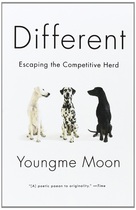
Youngme Moon’s Different is a book for those of you who don’t read business books. Her book has helped me more clearly see the world differently. The primary message from Moon is this:
Get off the treadmill that’s taking you nowhere. Adding features, augmentations, and gimmicks to beat the competition has the perverse result of making you like everyone else.
Different has helped me improve my perspective on what it means to actually do/create something that is different—different in a sense that is comprehensive as well as fundamental. I recommend reading this book if you want to learn about the stories behind the outliers, mavericks, iconoclasts. These are the major players who have rejected conventional wisdom in favor of an approach that is more adventurous. By reading Different shows how to succeed in a world where conformity reigns…but exceptions rule.
Here are my detailed notes.
Get off the treadmill that’s taking you nowhere. Adding features, augmentations, and gimmicks to beat the competition has the perverse result of making you like everyone else.
Different has helped me improve my perspective on what it means to actually do/create something that is different—different in a sense that is comprehensive as well as fundamental. I recommend reading this book if you want to learn about the stories behind the outliers, mavericks, iconoclasts. These are the major players who have rejected conventional wisdom in favor of an approach that is more adventurous. By reading Different shows how to succeed in a world where conformity reigns…but exceptions rule.
Here are my detailed notes.
Stop Stealing Dreams
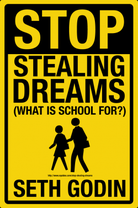
Stop Stealing Dreams is a longer manifesto by Seth Godin. You can get it here for free. Among many new insights I gleaned, he shares the interesting origin of multiple-choice tests and explains that memorizing information is pointless when you have a computer in your pocket.
Seth breaks it all down so the reader quickly understands that the world has changed and unfortunately the school system is exactly that, a industrialized "system," working on a massive scale, that has significant byproducts, including the destruction of many of the attitudes and emotions we’d like to build our culture around. In the early industrial economy of the 19th and 20th centuries the two biggest challenges were finding enough compliant workers and finding enough eager customers. School was invented to solve these problems, and it worked.
The 21st century economy needs creative thinkers and problem solvers, not mindless cogs that are obedient, on-time, and work to make widgets cheaper and faster than the day before.
Seth breaks it all down so the reader quickly understands that the world has changed and unfortunately the school system is exactly that, a industrialized "system," working on a massive scale, that has significant byproducts, including the destruction of many of the attitudes and emotions we’d like to build our culture around. In the early industrial economy of the 19th and 20th centuries the two biggest challenges were finding enough compliant workers and finding enough eager customers. School was invented to solve these problems, and it worked.
The 21st century economy needs creative thinkers and problem solvers, not mindless cogs that are obedient, on-time, and work to make widgets cheaper and faster than the day before.
The Leadership Challenge: How to Make Extraordinary Things Happen in Organizations
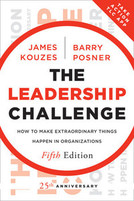
Jim Kouzes and Barry Posner's The Leadership Challenge is over thirty years of research selected from decades of asking leaders what they're doing when they're in top form, these authors process the core of leadership. When discussing power and delegation, they write, "Leaders accept and act on the paradox of power. You become more powerful when you give your own power away."
Wait: The Art and Science of Delay
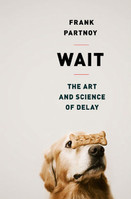
In Wait, author Frank Partnoy, observes that when making decisions you need to be able to understand whether you're operating at a Twitter or glacial pace (two contexts that might be happening simultaneously). "What really good leaders are able to do is inspire the rest of the team by their knowledge of the granular," Partnoy says, "but also be able to step back from the granular and put together the tectonic pieces that need to be placed together."
The Power of Habit: Why We Do What We Do in Life and Business
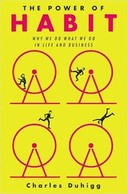
In The Power of Habit by Charles Duhigg, he explores how habits shape our lives and how savvy businesses can shape them.
For example, Febreeze, flopped when it launched as an odor killer, because "the people who needed it, who lived with nine cats, had adapted to the [odor].” After noticing that people look proud after making their beds - a habit to capitalize on - P&G rebranded the spray as a post-cleaning reward, one that now makes $1 billion a year.
For example, Febreeze, flopped when it launched as an odor killer, because "the people who needed it, who lived with nine cats, had adapted to the [odor].” After noticing that people look proud after making their beds - a habit to capitalize on - P&G rebranded the spray as a post-cleaning reward, one that now makes $1 billion a year.
Extreme Productivity: Boost Your Results, Reduce Your Hours
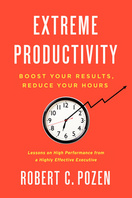
The author, Bob Pozen, once simultaneously served as president of Fidelity Management, lectured full-time at Harvard Business School, and wrote for the Harvard Business Review - this guy knows a thing or two about productivity and therefore he's earned the right to write a book called Extreme Productivity. Pozen explains about turning career plans into daily actions "If you want an active schedule, you have to husband your time so you can act on the things that are important."
Quiet: The Power of Introverts in a World That Can't Stop Talking
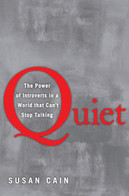
In Quiet, Susan Cain makes the argument that introverts are a reservoir of untapped talent, and that contemporary managers can actually create environments in which these introverts can thrive.
At least 1/3 of the people we know identify themselves as introverts. They are the ones who prefer listening to speaking and reading to partying. They are those who innovate and create but dislike self-promotion. They favor working on their own over brainstorming in teams.
Even thought they are often labeled as being "quiet" or "shy," it is to introverts that we owe many of the great contributions to society. From Van Gogh’s sunflowers to the invention of the PC. Thanks introverts!
At least 1/3 of the people we know identify themselves as introverts. They are the ones who prefer listening to speaking and reading to partying. They are those who innovate and create but dislike self-promotion. They favor working on their own over brainstorming in teams.
Even thought they are often labeled as being "quiet" or "shy," it is to introverts that we owe many of the great contributions to society. From Van Gogh’s sunflowers to the invention of the PC. Thanks introverts!
Zarrella's Hierarchy of Contagiousness: The Science, Design, and Engineering of Contagious Ideas

In Zarrella's Hierarchy of Contagiousness, social media expert Dan Zarella writes about how to maximize your efforts and impact in social media networks like Facebook and Twitter. After reading this book once I had answers to questions I never even thought of. I found the book extremely helpful. One of my favorite sections was on the timing of tweets. Have you ever thought about the best time to tweet? Dan even shares what the least and most effective retweetable words are. He's done his homework and he has the stats to back-up his conclusions. This is a short ebook you could read in an afternoon. I highlighted a ton of it and I've gone back several times to review. Dan deconstructs how social media works, who it benefits and why we all depend on it to spread our ideas.
Poke The Box
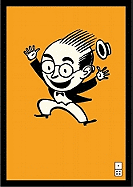
Brief manifestos are wonderful! Not only does it feel good to have finished a book so quickly, but it feels even better to be completely motivated to do something remarkable when you're done. This whole book is about about getting into the routine of just starting things.
| poketheboxworkbook.pdf | |
| File Size: | 269 kb |
| File Type: | |
Anything You Want

I had no expectations when I got this book. But I love it when you start a book that way and then get totally blown away. This book is a gem, I love it!
Derek Sivers is truly today's new entrepreneur, he also has a gift as an incredible teacher. This book details the unlikely and interesting rise of CDBaby.com, explains the mistakes Derek made as its founder, and teaches about "relational databases" using analogies. Derek makes things that are complicated to understand so very simple and practical.
This book caused me to have a paradigm shift over the way I think about doing business and really discover what kind of businessman I am. This book is about how to create, manage and give up a dream that transformed into an idea that was into a solution that accidentally turned into a business that eventually became an organization that made money a lot of money. Maybe I liked this book so much because, like Derek, I too like to solve problems, I get that money is not the primary goal, and I want to live life on my own terms. So many people are always looking for the next big thing. Now I just look for whatever comes next. I think we'd all be better served just solving the immediate problems that lie in front of us and just see where that takes us.
Some favorite quotes:
"Don't pursue business just for your own gain. Only answer the calls for help."
"If you think true love looks like Romeo and Juliet, you'll overlook a great relationship that grows slowly. Revolution - in business and in life - often starts with a small step."
Derek Sivers is truly today's new entrepreneur, he also has a gift as an incredible teacher. This book details the unlikely and interesting rise of CDBaby.com, explains the mistakes Derek made as its founder, and teaches about "relational databases" using analogies. Derek makes things that are complicated to understand so very simple and practical.
This book caused me to have a paradigm shift over the way I think about doing business and really discover what kind of businessman I am. This book is about how to create, manage and give up a dream that transformed into an idea that was into a solution that accidentally turned into a business that eventually became an organization that made money a lot of money. Maybe I liked this book so much because, like Derek, I too like to solve problems, I get that money is not the primary goal, and I want to live life on my own terms. So many people are always looking for the next big thing. Now I just look for whatever comes next. I think we'd all be better served just solving the immediate problems that lie in front of us and just see where that takes us.
Some favorite quotes:
"Don't pursue business just for your own gain. Only answer the calls for help."
"If you think true love looks like Romeo and Juliet, you'll overlook a great relationship that grows slowly. Revolution - in business and in life - often starts with a small step."
Rework
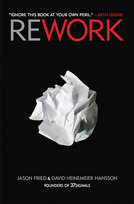
Rework is worth your time. This book is worth your money. This book is short (about 90 1-2 page essays). This book is no holds barred! This book will make you feel really uncomfortable. And you will need to feel this way if you are going to rework the way you work. The guys from 37signals, Jason and David, break all the rules. They cut the crap and demonstrate that the regular way, or just going along to get along, is not inescapably the right way, or the only way.
| rework.pdf | |
| File Size: | 1796 kb |
| File Type: | |
Purple Cow
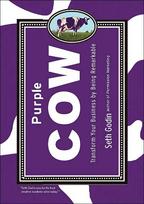
In his best-known book, Purple Cow, Seth’s message was, “Everyone’s a marketer now.”
A must read for anyone who does marketing. With the world is changing rapidly before our eyes, you need to understand that the rules of marketing are no different. The old system is broken, you're competing now for a few seconds of people's time and you need to stand out and be remarkable.
The old skool TV commercials, magazine and newspaper ads don't work like they used to because consumers are tun thing them out. Before you start reading this book, toss out everything you know about marketing.
The most important concept you should take away from this book is that you should do something "remarkable" (this means doing something that others think is worth making a remark about). Seth discusses creating new ways of doing old businesses. The messages are short and to-the-point, like: be outrageous, tell the truth, test the limits and never settle for just "very good."
A must read for anyone who does marketing. With the world is changing rapidly before our eyes, you need to understand that the rules of marketing are no different. The old system is broken, you're competing now for a few seconds of people's time and you need to stand out and be remarkable.
The old skool TV commercials, magazine and newspaper ads don't work like they used to because consumers are tun thing them out. Before you start reading this book, toss out everything you know about marketing.
The most important concept you should take away from this book is that you should do something "remarkable" (this means doing something that others think is worth making a remark about). Seth discusses creating new ways of doing old businesses. The messages are short and to-the-point, like: be outrageous, tell the truth, test the limits and never settle for just "very good."
Do The Work
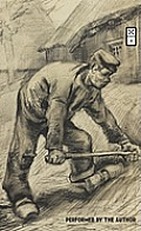
Steven Pressfield’s offers a totally new way to confront creative battles using practical tools derived from his own experience as a writer (This guy wrote "The Legend of Bagger Vance."). This book will inspire you to get out of your own way in pursuing your dreams. He sheds light on the Resistance, the enemy - the intelligent, active, malign force working against you. He teaches that the first step is to recognize it. Doing so will give you the power you need to do the work and finish the task at hand.
The Dip
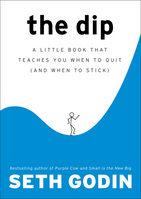
I have to warn you, reading this book will make you feel really uncomfortable...and don't be surprised that when upon completing the final chapter you walk into work and quit your job.
You're either in a cul-de-sac or you're in the dip. If you're in a cul-de-sac you should quit because your situation will never improve.
I liken dips unto learning curves, often things are really hard at first but their is a light at the end of the tunnel and once you've conquered that curve you situation improves and you become happier. A cul-de-sac is torture, you're at a dead-end, things will never change, so you should quit. There is no shame in quitting because there's no point in sticking it out if the end result is not attainable. The tough part is in determining if it's truly possible to get where you want to be. Once you know this the decision to quit or hang in there through the dip is easy.
You're either in a cul-de-sac or you're in the dip. If you're in a cul-de-sac you should quit because your situation will never improve.
I liken dips unto learning curves, often things are really hard at first but their is a light at the end of the tunnel and once you've conquered that curve you situation improves and you become happier. A cul-de-sac is torture, you're at a dead-end, things will never change, so you should quit. There is no shame in quitting because there's no point in sticking it out if the end result is not attainable. The tough part is in determining if it's truly possible to get where you want to be. Once you know this the decision to quit or hang in there through the dip is easy.
The 4-Hour Body
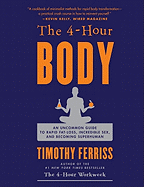
This is not a business book. This is Tim's report on his experience hacking the human body. It's all about the MED (minimum effective dose). This book is really like an encyclopedia, you're not supposed to read the whole thing cover-to-cover (I sure haven't yet). But pick out the sections
that interest you most and go from there.
This book really is legit, I lost 25 lbs in 30 days by following the Slow Carb Diet and I never felt hungry once. From other principles I learned in this book I now: sleep better, feel healthier and stronger, run faster, and think much clearer.
If you want to feel and look like your best self, give this book a read. I wouldn't recommend it if it didn't help me tremendously.
that interest you most and go from there.
This book really is legit, I lost 25 lbs in 30 days by following the Slow Carb Diet and I never felt hungry once. From other principles I learned in this book I now: sleep better, feel healthier and stronger, run faster, and think much clearer.
If you want to feel and look like your best self, give this book a read. I wouldn't recommend it if it didn't help me tremendously.
The Mormon Way of Doing Business
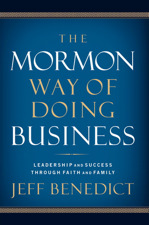
You don't have to be a Mormon to appreciate this book. It is not a book full of propaganda for the The Church of Jesus Christ of
Latter-Day Saints. It's just about how some successful Mormon businessmen and CEO's operate in accordance with the values taught by their faith.
Jeff primarily focuses on the moral values that make a difference in the lives of these men who make significant contributions to their companies and the employees they lead and care for as well as their families, and of course their church. Their identities are deeply rooted in things (such as family, a desire to serve) other than wealth, fame, and status (although they have these things too).
After reading this book, you may wonder "Do Mormons ever sleep?" Certainly, the schedules of these guys seem super-human, yet none of them complain. If you are interested in learning how to balance work and family life, then this book is for you.
Jeff primarily focuses on the moral values that make a difference in the lives of these men who make significant contributions to their companies and the employees they lead and care for as well as their families, and of course their church. Their identities are deeply rooted in things (such as family, a desire to serve) other than wealth, fame, and status (although they have these things too).
After reading this book, you may wonder "Do Mormons ever sleep?" Certainly, the schedules of these guys seem super-human, yet none of them complain. If you are interested in learning how to balance work and family life, then this book is for you.
Delivering Happiness: A Path to Profits, Passion, and Purpose
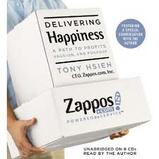
Tony Hsieh's account of starting zappos.com is a truly inspirational story. What impresses me most about this guy is that he is so charitable and unselfish, and because of these characteristics he's now very successful.
If you want to truly understand how to build a culture in your organization, then this book is a must read.
The most critical thing I took away from Tony's story was this simple fact: If you don't get in control of your finances, then you'll never get to work on the fun things like cultivating a remarkable culture.
If you want to truly understand how to build a culture in your organization, then this book is a must read.
The most critical thing I took away from Tony's story was this simple fact: If you don't get in control of your finances, then you'll never get to work on the fun things like cultivating a remarkable culture.
The E-Myth - Revisited
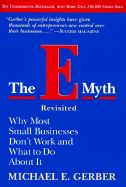
This book is really a guide for anyone who thinks they want to start a small business...or for those who already have. If you've already started a small business, when you read this book you may think Michael Gerber knows you personally...and he just might! He knows what you are going through and this book will help you become successful.
Gerber observes that most small businesses are started by Technicians, these are the kind of people that are very skilled at something and enjoy doing that thing - a chef, graphic artist, programmer, hair stylist, engineer. These Technicians will eventually come to hate the work they do because they hate having to wear the hat of the Manager and Entrepreneur to run their business. This is because they don't own a business, they just own a job. The Technician is the worker-bee, the one who produces the product. The Manager makes sure operations and finances run smoothly and consistently. The Entrepreneur formulates the goals, and steers the business in the direction needed to reach those goals. Of these three personalities, the Entrepreneur is key - without her, the Technician will work herself to death or bankruptcy. As the business grows, the business owner will need to draw away from the Technician work and Manager work and delegate this work, rather than surrendering it to others.
A Technician-owned business needs to have a balance over its business personalities. According to Gerber, every business owner needs to simultaneously be an Entrepreneur and a Manager as well as a Technician. If you can't be all three, then find people who can fill these voids or get out of business.
Gerber observes that most small businesses are started by Technicians, these are the kind of people that are very skilled at something and enjoy doing that thing - a chef, graphic artist, programmer, hair stylist, engineer. These Technicians will eventually come to hate the work they do because they hate having to wear the hat of the Manager and Entrepreneur to run their business. This is because they don't own a business, they just own a job. The Technician is the worker-bee, the one who produces the product. The Manager makes sure operations and finances run smoothly and consistently. The Entrepreneur formulates the goals, and steers the business in the direction needed to reach those goals. Of these three personalities, the Entrepreneur is key - without her, the Technician will work herself to death or bankruptcy. As the business grows, the business owner will need to draw away from the Technician work and Manager work and delegate this work, rather than surrendering it to others.
A Technician-owned business needs to have a balance over its business personalities. According to Gerber, every business owner needs to simultaneously be an Entrepreneur and a Manager as well as a Technician. If you can't be all three, then find people who can fill these voids or get out of business.
The 4-Hour Workweek
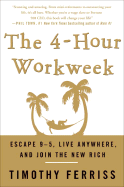
In this book, Tim Ferris encourages you to consider other ways of living your life instead of working hard toward an eventual retirement. Before this book I followed the model I had learned from society, I never really thought about possible alternatives, that's for people on TV, right?
While reading this book, something clicked and I realized that the "live your life now, don't wait until later" concept is what Tim was telling me. This concept is certainly not new, nevertheless, being the workhorse that I am, I needed the wake-up-call.
Some of the advice Tim offers is: 1. automate certain administrative tasks, 2. check email less frequently even if you think your world might end if you do, 3. find a "muse" business model with the help of affiliate marketing, drop shipping, and faking credibility. You'll have to read the book to get all the unconventional advice.
Much of Tim's advice I don't exactly agree with, it works for him but it probably won't all work for you. But it's good to be aware of. I certainly adapted his advice on automation and productivity so I could get 22 hours of work done in just 10.
There is definitely a great deal of criticism out there regarding this book. Many people hate what Tim has to say about "outsourcing." But the reality is, we live in an outsourced world! None of us are entirely self-sufficient. The clothes you've got on were all made in India, the produce you ate today was all picked by migrant workers from South America, and your iPhone was manufactured in China. Understand it, then get over it.
While reading this book, something clicked and I realized that the "live your life now, don't wait until later" concept is what Tim was telling me. This concept is certainly not new, nevertheless, being the workhorse that I am, I needed the wake-up-call.
Some of the advice Tim offers is: 1. automate certain administrative tasks, 2. check email less frequently even if you think your world might end if you do, 3. find a "muse" business model with the help of affiliate marketing, drop shipping, and faking credibility. You'll have to read the book to get all the unconventional advice.
Much of Tim's advice I don't exactly agree with, it works for him but it probably won't all work for you. But it's good to be aware of. I certainly adapted his advice on automation and productivity so I could get 22 hours of work done in just 10.
There is definitely a great deal of criticism out there regarding this book. Many people hate what Tim has to say about "outsourcing." But the reality is, we live in an outsourced world! None of us are entirely self-sufficient. The clothes you've got on were all made in India, the produce you ate today was all picked by migrant workers from South America, and your iPhone was manufactured in China. Understand it, then get over it.
Outliers
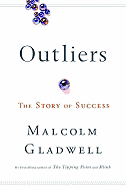
In Outliers, Malcolm Gladwell writes about the 10,000 Rule. He explains that it takes 10,000 hours to become an expert in a given field, to actually master the subject.
He also writes about how one's personal life circumstances have a considerable amount to do with their success, probably as much as their personal determination to be successful. Who your parents are, where you are born, and other life experiences play a major role in what you will be able to accomplish.
He also writes about how one's personal life circumstances have a considerable amount to do with their success, probably as much as their personal determination to be successful. Who your parents are, where you are born, and other life experiences play a major role in what you will be able to accomplish.
Linchpin
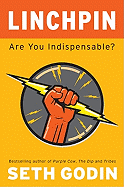
Seth wrote this book to make a difference, and he did, for me and many others. Seth teaches you how to become a Linchpin and encourages you to do work that matters.
What is a Linchpin? Seth explains that a Linchpin is somebody in an organization who is indispensable, someone who cannot be replaced. A Linchpin's mantle is just far too unique and valuable.
Reading this book will help you realize that you need to be a Linchpin. Your really don;t have any other choice in today's world of work. Not becoming a Linchpin would be economic and career suicide.
The message in this book is that, "Everyone’s an artist now." I like the sound of that, I always considered myself an artist even though I'm not a painter or sculptor. Seth’s definition of an artist is not just someone who pants or sculpts, an artist is somebody who does “emotional work.” I love this definition because we all do perform emotional labor, this is the kind of work you put your heart and soul into. This is the kind of work that matters. This is the kind of work that you would love to do on your day off. Seth explains, "It’s not what you do, it’s the way that you do it."
You can only become a Linchpin if you have the capacity to do “emotional work” at a high level.
The world is way too interesting and competitive now. Most of the people you work with are mindless cogs, just trudging around the office or warehouse looking to turn up their paycheck.
The uncomfortable challenge from Seth is this: become a Linchpin, make the leap, become an artist, perform emotional labor, and do work that matters.
What is a Linchpin? Seth explains that a Linchpin is somebody in an organization who is indispensable, someone who cannot be replaced. A Linchpin's mantle is just far too unique and valuable.
Reading this book will help you realize that you need to be a Linchpin. Your really don;t have any other choice in today's world of work. Not becoming a Linchpin would be economic and career suicide.
The message in this book is that, "Everyone’s an artist now." I like the sound of that, I always considered myself an artist even though I'm not a painter or sculptor. Seth’s definition of an artist is not just someone who pants or sculpts, an artist is somebody who does “emotional work.” I love this definition because we all do perform emotional labor, this is the kind of work you put your heart and soul into. This is the kind of work that matters. This is the kind of work that you would love to do on your day off. Seth explains, "It’s not what you do, it’s the way that you do it."
You can only become a Linchpin if you have the capacity to do “emotional work” at a high level.
The world is way too interesting and competitive now. Most of the people you work with are mindless cogs, just trudging around the office or warehouse looking to turn up their paycheck.
The uncomfortable challenge from Seth is this: become a Linchpin, make the leap, become an artist, perform emotional labor, and do work that matters.
Talent is Overrated
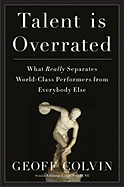
Natural genius is a myth. Even recent scientific findings support the notion that success is the product of disciplined practice – not an uncontainable natural genius. I realized this simple principle after reading Talent is Overrated by Geoff Colvin. The examples of the work ethic in Mozart and Michael Jordan were very inspiring. They were not born with their amazing abilities; they were driven to the point where they wanted to practice music and basketball all day long, every single day. It was only after long periods of deliberate practice that they became incredibly skilled. That's what this book is about. Now you have no excuse NOT to be remarkable...other than pure laziness.
What the Dog Saw
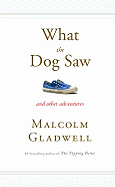
Malcolm's book comes from various editorials he's made in the New Yorker. All the chapters of this book are about "hidden extraordinary." Malcolm writes about some weird stuff you'd never even think about, like what hair dye tells us about twentieth century history, and dog whisperer Cesar Millan's uncanny ability to understand and be understood by the dogs he trains. Overall, it will really help you start to find and appreciate the extraordinary in everyday people and things.
Switch
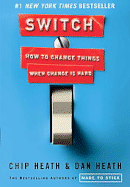
This is an awesome psychology book about ways to make real change...and make it last over the long-haul. The Author's insights are all based on facts. My favorite example: Want to get people to eat less food? You could teach them about portion sizes, have them read books on healthy eating habits...or just give them smaller plates.
Crush It!
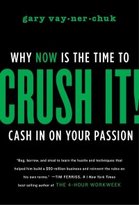
Crush It! by Gary Vaynerchuk is all about branding yourself. We now live in the age of idea diffusion. People who can successfully spread ideas, win. Gary teaches that because of the internet we have no excuse not monetizing on the things that we have a passion for because life is too short to work a job you don't love. He also covers how to correctly harness social media to your advantage.
A Message To Garcia
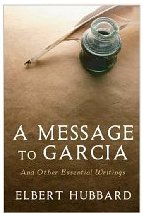
This is a very short book. You can read it on your lunch hour. I love this story!
Essentially, what it's about is this:
Go! Do the work, don't ask for directions. Just get the work done.
Essentially, what it's about is this:
Go! Do the work, don't ask for directions. Just get the work done.
The Third Wave
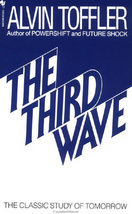
Alvin Toffler’s book, The Third Wave: The Classic Study of Tomorrow, introduces the concept of “waves of change, each one largely obliterating earlier cultures or civilizations and replacing them with ways of life inconceivable to those who came before." Toffler primarily focuses on relationships between the collisions of these waves. The First Wave originated from the agricultural revolution, which collided with primitive populations that predominantly focused on hunting, scavenging, and fishing. The economy of the First Wave was that of a farming society; people created and consumed their very own commodities and there were very few exchanges between clustered families of relatives. The Second Wave was brought about through the industrial revolution, which collided with the agricultural communities. The industrial society of the Second Wave saw the birth of the “nuclear family, the factory-style school, and corporations." During this time the corporation experienced unrestrained specialization, a stalwart focus on economies of scale and division of labor. Inevitably, people stopped creating products for themselves, but rather, they spent all day working in a factory creating commodities that were sold to other consumers. The primary characteristic of a Second Wave economy can be found in the rift between producer and consumer. Toffler explains that during the mid 1950’s the Third Wave began to collide with the Second Wave. We are currently living in an era of collision, which effectuates a fight for the future. In contrast to previous collisions that were between classes, races, ideologies, or regions, “the bitter struggle is now raging between those who seek to preserve industrialism and those who seek to supplant [and advance beyond] it."
Tribes
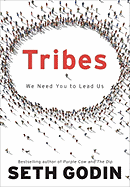
In Tribes, Seth's message is, “Everyone’s a leader now.”
I've listened to this audio book numerous times, I love it. It's a stimulating look at what it really takes to organize and mobilize groups of people (tribes). There is a tribe out there just waiting for you to lead it. Seth will teach you how to find and lead it.
Prepare To Sell Your Company
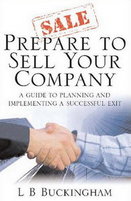
The worst thing you can do is run a company for your own self interests. If you do, it will eventually burn you out and you'll want to sell it...But wait! You haven't been managing it to be sold, you've been managing it to serve your lifestyle. Well, now you've got a mess to clean up and it's going to take you 3-5 years. In this book, LB Buckingham breaks it all down for you so you can get things fixed so your business can become attractive to potential investors.
If you happen to read this before starting your business, then good for you! Now don't get stupid.
If you happen to read this before starting your business, then good for you! Now don't get stupid.
Das Kapital
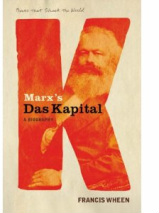
If you're a socialist you should really read about what Marx was all about so you understand why you've decided to be liberal. Seems like liberalism is the new black these days. If you're a self-proclaimed capitalist, then a good understanding of pure capitalism from Marx's era will help you realize how crappy life was working for the man in a hot sweaty factory for 18 hours a day. Open you're mind and get some perspective - this book is not hexed, nor is it the answer.
